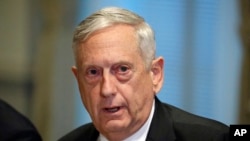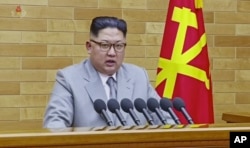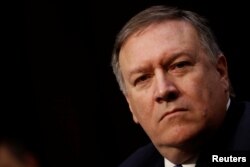U.S. President Donald Trump's decision to sit down for talks with North Korean leader Kim Jong Un came as no surprise to top U.S. military officials, though they are wary of setting any expectations.
The Pentagon said Friday that Defense Secretary Jim Mattis was in contact with the White House and involved in the decision to accept the North Korean leader's offer.
But military officials also said the decision to talk with North Korea should not be mistaken for any weakening of U.S. resolve.
"The [Defense Department] will continue to support the global maximum pressure campaign against North Korea," a Pentagon spokesman said, referring to ramped-up economic sanctions that have been imposed against Pyongyang for its nuclear weapons and missile development programs.
"The maximum pressure campaign is clearly having an impact," he added.
Drills to continue
As part of the agreement to meet, Kim Jong Un agreed that routine U.S.-South Korea military drills would continue as scheduled next month. The North usually protests the drills, which Pyongyang views as preparations for an invasion.
Despite that apparent concession, there are questions as to whether the sanctions targeted at the North have made enough of an impact on its government to make Kim want to start negotiations in earnest.
"Obviously, we're cautiously optimistic that there is some forward progress here," Mattis told reporters this week, following a meeting with Estonia's defense minister at the Pentagon.
"But we've been optimistic before, so we're going to have to watch actions and see if they match words," he said.
U.S. intelligence officials also expressed skepticism as word began to spread earlier this week that North Korea might be prepared to hold talks with Washington.
"Hope springs eternal but we need to learn a lot more relative to these talks," Director of National Intelligence Dan Coats told the Senate Armed Services Committee during a hearing Tuesday on worldwide threats.
Sitting next to Coats, the head of the Defense Intelligence Agency also sought to tamp down any expectations.
'Show me'
"Right now, I don't share your optimism," Lieutenant General Robert Ashley told one of the senators in response to a question. "That's kind of a 'show me,' and so we'll see how this plays out."
One of the key questions for many officials is just how far Kim Jong Un is willing to go. So far, there have been few signals from Pyongyang itself, which relied on South Korean officials to deliver the offer of talks to the U.S.
"A key pillar of President Moon's election campaign was increased rapprochement with the North," said Bruce Klingner, a former CIA division chief for the Koreas, now with the Washington-based Heritage Foundation.
"Whether or not these promises relayed from the North are being viewed through rose-colored glasses remains to be seen," Klingner said. "But several decades of history with a nuclearizing North Korea would indicate the regime is trying to take advantage of Seoul's desire for a diplomatic resolution."
Intelligence officials have also warned about the need to treat any overtures from the North Korean leader with care.
While the White House has been quick to publicly question Kim's mental stability and ridicule his bluster, intelligence officials say Kim is a "very rational actor" who has repeatedly displayed a "clarity of purpose" through his actions.
"To some, testing nuclear weapons while your people are starving is not rational," a U.S. intelligence official previously told VOA. "But when you believe those weapons are critical to your survival, it is not so irrational."
And there have been growing concerns Kim is not content to use his nuclear weapons and missile programs for mere survival.
'For coercive purposes'
"What's important to recognize is that North Korea is pursuing this nuclear weapon, not for just defensive purposes that you hear some people argue about, but really for coercive purposes, for offensive purposes, and the world has to recognize that," White House national security adviser Lieutenant General H.R. McMaster told VOA earlier this year.
So, too, the latest U.S. Worldwide Threat Assessment, issued last month, casts doubt on the notion Kim is willing to give up his country's nuclear arsenal.
"Pyongyang's commitment to possessing nuclear weapons and fielding capable long-range missiles, all while repeatedly stating that nuclear weapons are the basis for its survival, suggests that the regime does not intend to negotiate them away," the intelligence report said.
"North Korea is likely to press ahead with more tests in 2018," it said, referencing threats by North Korea's foreign minister to carry out an atmospheric nuclear test over the Pacific Ocean.
Central Intelligence Agency Director Mike Pompeo has also warned North Korea is likely just months away from being able to hit the United States with a nuclear-armed missile.
"We do believe that Kim Jong Un, given these tool sets, would use them for things besides simply regime protection," Pompeo warned during a speech in January.
"Call it coercive, how Kim Jong Un is prepared to use these nuclear weapons," Pompeo said, describing the North Korean leader's ultimate goal as "reunification of the [Korean] Peninsula under his authority."















